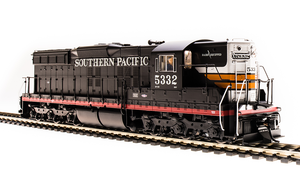5800 EMD SD9, BNSF 1586, Swoosh Scheme, Paragon3 Sound/DC/DCC, HO (Non-Prototypical)
| Introduced in February 1952 and produced through November 1953, the SD7 was the 1500HP six axle big brother to the GP7. Riding on six axles, three-motor trucks, they were designed to offer more starting tractive effort in road service than the GP7. EMDs introduction of an A1A freight locomotive led them to design the SD7 from the ground up. In appearance, they are very similar to the GP7 only with a longer hood. The radiators are grouped together at the end of the long hood and not separated as was seen on the GP7. The grill assembly protrudes from the side of the hood whereas with the GP7 the grills are fit flush with the hood. As built, the SD7 very closely resembles the SD9 with the visual spotting features being the boarding steps and a variation of the classification lights. The SD7 (for Special Duty) was a massive locomotive at 60 feet 8 inches from coupler to coupler and weighing 360,000 pounds. It was powered by the same reliable 1500HP 567B V-16 two-cycle diesel engine as the GP7 and F7. With a maximum speed range between 55 and 89 miles per hour, depending on the gearing ratio selected, and a tractive force of 90,000 pounds, the SD series was here to stay. With the SD7, EMD introduced the lightweight Flexicoil truck which enabled these locomotives to be used on branchlines as well as for road service. These trucks were so smooth that the SD7 was compared to riding in a luxury car. With the advent of 1954, EMD made a conservative marketing push against the competition with the announcement of their Nine Line series. This consisted of the introduction of new locomotive model numbers, the SW9/1200, the F9A/B, the GP9, and the SD9.
|








